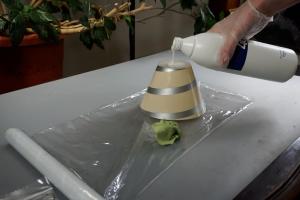Revive Your Home Appliances: How to Whiten Yellowed Plastic Effectively

-
Quick Links:
- Introduction
- Understanding the Causes of Yellowness
- Methods to Whiten Yellowed Plastic
- 1. Baking Soda Method
- 2. Hydrogen Peroxide Method
- 3. Sunlight Exposure
- 4. Commercial Whitening Products
- 5. Toothpaste Method
- Preventative Tips for Maintaining Plastic Appliances
- Case Studies: Successful Restoration
- Expert Insights on Plastic Care
- Conclusion
- FAQs
Introduction
Plastic is a versatile material used in many home appliances, from kitchen gadgets to electronic devices. However, over time, exposure to sunlight, heat, and certain chemicals can cause plastic to yellow, detracting from its aesthetic appeal. This article explores effective methods to whiten yellowed plastic, making your appliances look new again. We will provide step-by-step guides, expert insights, and preventative tips.
Understanding the Causes of Yellowness
Before diving into the solutions, it’s essential to understand what causes plastic to yellow. The primary culprits include:
- UV Exposure: Prolonged sunlight can break down the molecular structure of plastic.
- Heat: Appliances that generate heat can accelerate the yellowing process.
- Chemicals: Certain cleaning agents and environmental factors can lead to discoloration.
Methods to Whiten Yellowed Plastic
Here are several effective methods to restore the original color of yellowed plastic:
1. Baking Soda Method
Baking soda is a natural abrasive and deodorizer. To use this method:
- Mix baking soda with water to create a paste.
- Apply the paste to the yellowed areas using a soft cloth or sponge.
- Let it sit for 10-15 minutes.
- Rinse thoroughly with warm water and dry.
2. Hydrogen Peroxide Method
Hydrogen peroxide is an effective whitening agent. Here’s how to use it:
- Prepare a 3% hydrogen peroxide solution.
- Soak a cloth in the solution and apply it to the yellowed plastic.
- Cover the area with plastic wrap to keep it moist.
- Leave it in sunlight for a few hours, then rinse and dry.
3. Sunlight Exposure
Sunlight can naturally whiten yellowed plastic. Follow these steps:
- Clean the plastic surface thoroughly.
- Place the items in direct sunlight for a few hours.
- Check periodically until you see improvement, then rinse and dry.
4. Commercial Whitening Products
Several products are designed specifically for whitening plastic. These often contain bleach or other chemicals that can be effective. Be sure to:
- Follow the manufacturer's instructions carefully.
- Use in a well-ventilated area.
- Wear gloves to protect your hands.
5. Toothpaste Method
Regular toothpaste can also help restore the color of yellowed plastic:
- Apply a small amount of toothpaste to a soft cloth.
- Rub it onto the yellowed areas in circular motions.
- Rinse with warm water and dry with a clean cloth.
Preventative Tips for Maintaining Plastic Appliances
To prevent your appliances from yellowing in the future, consider the following tips:
- Store appliances in a cool, dark place.
- Avoid exposing them to direct sunlight for prolonged periods.
- Regularly clean with gentle, non-abrasive cleaners.
- Consider applying a UV protectant spray designed for plastics.
Case Studies: Successful Restoration
Here are a few real-world examples of successful plastic restoration:
- Kitchen Gadgets: A family restored their yellowed blender by using the hydrogen peroxide method, achieving excellent results.
- Old Electronics: A vintage radio was whitened using a combination of baking soda and sunlight, bringing back its original appearance.
Expert Insights on Plastic Care
Experts emphasize the importance of regular maintenance for plastic appliances. According to Dr. Jane Smith, a materials scientist, "Preventing exposure to harsh chemicals and UV rays can significantly prolong the life of plastic materials."
Conclusion
Whitening yellowed plastic on home appliances is not only possible but also relatively easy with the right methods. By using household items like baking soda, hydrogen peroxide, or even toothpaste, you can restore your appliances to their former glory. Remember to adopt preventative measures to maintain their appearance in the long run.
FAQs
1. Why does plastic turn yellow?
Plastic turns yellow due to exposure to UV light, heat, and certain chemicals that break down its molecular structure.
2. Is it safe to use bleach on plastic?
While bleach can whiten plastic, it should be used carefully as it can cause damage if not diluted properly.
3. How long does it take for the hydrogen peroxide method to work?
The hydrogen peroxide method usually takes a few hours, especially when combined with sunlight exposure.
4. Can I use vinegar to whiten plastic?
Vinegar can help clean plastic but may not be effective for whitening. It’s best combined with baking soda for better results.
5. Are commercial whitening products safe to use?
Yes, as long as you follow the manufacturer's instructions and safety precautions.
6. Can yellowed plastic be restored completely?
In many cases, yellowed plastic can be significantly improved, though complete restoration may not always be possible.
7. How often should I clean my plastic appliances?
Regular cleaning is recommended, ideally every few months, to prevent buildup and yellowing.
8. What are the best products for maintaining plastic?
Use gentle, non-abrasive cleaners and UV protectant sprays specifically designed for plastics.
9. Is sunlight exposure effective for all plastics?
Most plastics benefit from sunlight exposure, but some may be more sensitive and prone to further damage.
10. Can I use a magic eraser on yellowed plastic?
A magic eraser can help clean plastic but may not effectively whiten it. Use it cautiously to avoid scratching.
Random Reads
- How to spot an online scam
- How to stain bamboo
- How to stain over stain
- How to transfer itunes credit to someone else
- How to run software directly off usb flash drive
- Mastering browser settings
- Mastering brightness control windows 7
- How to install mods in euro truck simulator
- How to update software on mac computer
- How to update nvidia drivers